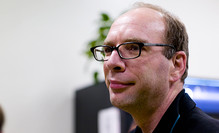 Credit: Attribution Some rights reserved by Joi
Credit: Attribution Some rights reserved by Joi Speaking at the event in Barcelona the New York University professor of journalism discussed his idea of the "great horizontal", where people are connected to others "as effectively as they are connected up to big media" and there is wider participation in the media.
If freedom of the press is only guaranteed to those who own one, as stated by New Yorker writer AJ Liebling, then we are in a golden age of press freedom as today almost anyone can, Rosen said.
"I'm aware there are many countries where there is no press freedom, but in countries where a tradition of a free press is established, there's more of it than there ever was.
"Anyone can doesn't mean everyone will, but the fact that anyone can matters to everyone and if it doesn't now, just wait, it will.
"The internet makes it possible for anyone to have their own press, or anyone to become a broadcaster, for anyone to participate in the media system.
"This is a very important fact about the media today and we need to have an attitude of realism about these changes … You never know who is going to participate and what they're going to contribute."
Referring to the concept of the 'mutualisation of news', as coined by Guardian editor Alan Rusbridger, Rosen said it was "a retirement programme for bloggers v journalists", which he added was an "old and increasingly stupid conflict". Similarly citizens are not out to replace professional journalists, he said.
"This whole discourse of replacement is one big distraction and we'd be much better off if we got rid of it … They [citizens] pass along news because people are social beings, they are social animals.
"The sooner people realise it's not about replacement, the better off they will be.
"Journalists should try and explain to people and show people that they, too, have a stake as to whether or not serious journalism survives and the best way is to actually engage them in the practice, to try and make the mutualisation of journalism a reality."
While greater participation in the media system brings a lot of practical problems to solve with it, such as information overload and verification, it is within the web itself we can find the solutions, he said.
"When the same network that floods us with too much information works to filter that flood, verification itself begins to scale.
"One of the problems comes from all the new levels of participation that we have, how do we know that this Tweet from Libya is somewhat reliable? How do we know that a person who says he's there is actually there?
"In the work of someone like Andy Carvin of NPR, he is using the same internet to find people throughout the world who can help verify information coming to him. That begins to turn the internet into the solution of the problem that the internet helps to create."
"We have to get much better at making smart filters because so many more people participate in the press today," he added.
Image by Joi on Flickr. Some rights reserved.
Free daily newsletter
If you like our news and feature articles, you can sign up to receive our free daily (Mon-Fri) email newsletter (mobile friendly).
Related articles
- Audiences, sources and strategies: Inside The New Humanitarian's Yemen Listening Project
- New community journalism project uses innovative storytelling to highlight the plight of insecure work
- App for journalists: MyScoop, for commissioning mobile and citizen journalism
- "This is what local journalism should really look like"
- Mobile journalism legend Yusuf Omar is joining Newsrewired









